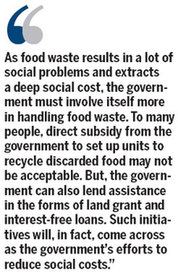Food waste as a social cost
Updated: 2013-11-15 06:56
By Raymond So(HK Edition)
|
|||||||||
To make a declaration of conflict of interest, I am a lover of food and like to taste different cuisines. I assume that many people in Hong Kong share my predilection. However, a food lover can also be a contributor to pollution. According to statistics, around one-third of Hong Kong's solid waste comprises food. Every day, more than 3,200 tons of food waste is being dumped into landfills. Clearly, there is a case for food waste management in Hong Kong.
The government is not unaware of the problem. It has launched the "Food Wise" campaign to advocate reduction of food waste. The campaign has several objectives, all of which aim to achieve a solution to the problem of tons of food going waste.

The problem can be attributed to economic reasons. Because Hong Kong society is getting more affluent, people have no experience of a food shortage. In old days, when life was difficult and the people were still poor, they did not waste food, so the problem never arose. Even though people did not finish everything on their plates, the leftovers would be used as fertilizer or to feed pigs and poultry. With Hong Kong transforming itself into an industrialized society and eventually, a service economy, agriculture no longer plays an important role. As such, it cannot absorb the food waste.
Clearly, we need a solution to this problem. An obvious one would be to recycle the wasted food. The challenges of such an enterprise can be viewed from both demand and supply perspectives. On the supply side, we need more recycling businesses so that waste food could be used as raw material for generating useful byproducts. It is widely known that leftover food can be used to produce fertilizers or fish feed. However, such an enterprise would require the installation of factories and in this aspect, lack of land supply could prove a major obstacle. Without sufficient land for factories, it is not possible to set up food-waste recycling plants. And, even if the land problem is solved, because of the high cost of production in Hong Kong, the final product may not remain competitive. It is no surprise that the city has so few food-waste recycling units.
On the demand side, there is an equal lack of forces to absorb the food waste. The problem, however, is to induce people to collect discarded food for future handling. Collecting leftovers is a difficult task, and discarded food cannot be stored owing to the nature of the product. If food waste needs to be systematically collected, the process should be streamlined. Otherwise, people will simply continue to put discarded food in garbage bins. Of course, awareness campaigns can help change this but that will not happen overnight. In other words, raising people's awareness of the benefits of properly handling leftover food is a lengthy process, which is why the government's "Food Wise" campaign may not prove to be very effective.

However, the government is designing a tariff scheme for garbage collection. This approach is correct. Again, imposing tariff is a way to induce long-term behavior change. Perhaps the government should concentrate more on the demand and supply sides discussed above. As food waste results in a lot of social problems and extracts a deep social cost, the government must involve itself more in handling food waste. To many people, direct subsidy from the government to set up units to recycle discarded food may not be acceptable. But, the government can also lend assistance in the forms of land grant and interest-free loans. Such initiatives will, in fact, come across as the government's efforts to reduce social costs.
The author is dean of the School of Business at Hang Seng Management College.
(HK Edition 11/15/2013 page9)